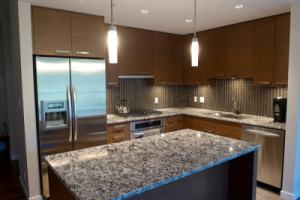Comparing Costs: Engineered Stone vs. Natural Stone for Countertops

Planning a kitchen remodel usually starts with one big decision—what kind of countertop to go with. The considerable you choice sets the tone for the whole space. Two of the top choices are engineered stone, known as quartz countertops, and natural stone, which often means quartzite countertops. Both look astounding and last for ages, but the value tags can be actual different.
So, how do you know which one makes sense for your kitchen? Let’s break it down and look at the costs, the upkeep, and the long-term value of each.
Engineered Stone: What You Should Know
What Exactly Is Engineered Stone?
Engineered stone, better known as quartz countertops, is a man-made material. It’s constructed from crinkly quartz minerals mixed with mastic and pigments. The result is a smooth, strong, and non-porous surface that works well in a busy kitchen.
Average Cost of Quartz Countertops
Standards for quartz vary depending on product, style, and surface. Here’s what most homeowners spend:
- Around $50 to $100 per square foot installed for standard options.
- Premium styles, especially ones with rare colors or surfaces, can run from $120 to $150 per square foot installed.
Why People Pick Quartz
- Tons of selections when it comes to hue and project.
- Easy to care for—no sealing needed.
- Strong against scratches, stains, and bacteria.
- Perfect for kitchenettes that get a ration of use.
Natural Stone: What You Should Know
What Is Natural Stone?
When persons talk about normal stone countertops, quartzite countertops are usually at the highest of the list. Quartzite stems from stonework that’s been energetic and pushed by nature pending it goes into a threatening, attractive stone. In fact, it’s stronger than stone, which brands it very tough.
Average Cost of Quartzite Countertops
Quartzite is typically more expensive than quartz. Here’s what to expect:
- About $70 to $120 per square foot installed for standard quartzite.
- Rare or exotic slabs can cost anywhere from $150 to $200 or more per square foot installed.
Why People Pick Quartzite
- Each lump is one-of-a-kind, giving your kitchen a usual touch.
- Highly resistant to heat.
- Known for its durability.
- Consumes the appearance of marble but with additional strength.
Side-by-Side Cost Breakdown
Here’s a fast look at in what way the two compare:
| Feature | Quartz Countertops | Quartzite Countertops |
| Type | Engineered stone | Natural stone |
| Average Cost | $50–$100 per sq. ft. installed | $70–$120 per sq. ft. installed |
| Premium Range | $120–$150+ per sq. ft. | $150–$200+ per sq. ft. |
| Maintenance | Very low, no sealing | Needs sealing |
| Durability | Scratch, stain, and bacteria resistant | Very hard and heat-resistant |
| Look | Consistent colors | Unique, natural appearance |
Installation Costs
Quartz Countertop Installation
Since quartz is planned, the slabs are unbroken, which makes them calmer to work with. Labor typically prices $15 to $30 per square foot.
Quartzite Countertop Installation
Quartzite is heavier and harder to cut, so it takes skilled professionals. Labor costs can go from $25 to $40 per square foot, which pushes the price higher.
Maintenance Costs Over Time
Taking Care of Quartz
- Just clean with soap and water.
- Doesn’t need sealing.
- Very resistant to stains, so upkeep is minimal.
Taking Care of Quartzite
- Needs sealing once or twice a year.
- Use a cutting board to avoid scratches.
- Avoid harsh cleaners and acidic spills.
In the extended run, quartzite can cost more to uphold because of the fastening.
Durability and Longevity
Quartz Countertops
- Tough, but not the best with heat.
- Can crack if exposed to extreme heat.
- A good choice for relatives who want strength without a lot of effort.
Quartzite Countertops
- One of the hardest natural stones.
- Can handle hot pots and pans directly.
- Less likely to scratch than quartz.
If you plan on staying in your home for years, quartzite might be worth the higher cost upfront.
Resale Value
Countertops are a big selling point for buyers. Both quartz and quartzite can improvement your family’s value:
- Quartz countertops interest buyers who want a contemporary look and easy care.
- Quartzite countertops draw in buyers who want luxury and natural stone appeal.
If you’re remodeling a home to sell, quartz might give you a solid return without overspending. But if you’re designing a dream kitchen, quartzite could be worth splurging on.
Choosing What’s Right for You
Budget Matters
- Quartz is the better pick if you need to keep costs lower.
- Quartzite is the choice if you want high-end and don’t mind the price.
Lifestyle Matters
- Busy families or homes in Milwaukee with kids might find quartz easier to manage.
- Homeowners who love natural variation and want something unique often prefer quartzite.
Pros and Cons at a Glance
Pros of Quartz Countertops
- Affordable compared to quartzite.
- Wide design selection.
- Minimal upkeep.
Cons of Quartz Countertops
- Not as resistant to heat.
- Patterns are manufactured, not natural.
Pros of Quartzite Countertops
- Each slab is naturally unique.
- Extremely durable and heat-resistant.
- Higher value for luxury homes.
Cons of Quartzite Countertops
- Higher upfront cost.
- Needs regular sealing.
Final Thoughts
Selecting amongst quartz countertops and quartzite countertops really derives down to budget and routine. Quartz is inexpensive and calmer to care for, which types it a popular choice for busy families in Milwaukee. Quartzite, though, gives you natural beauty and strength that can last a lifetime if you’re willing to invest a little more.
If you want low maintenance and consistency, quartz is the way to go. If you want normal style and durability, quartzite is worth the price. In the end, the best high-quality is the one that hysterics your home, your cookery habits, and your budget.
FAQs
1. Which is stronger, quartz or quartzite?
Quartzite is stronger and more heat-resistant, while quartz is durable but less resistant to extreme heat.
2. Do quartz countertops need sealing?
No, quartz countertops are non-porous and don’t need sealing.
3. How often does quartzite need to be sealed?
Usually once or twice a year, depending on use.
4. Which is cheaper in Milwaukee, quartz or quartzite?
Quartz is generally cheaper than quartzite, especially once you factor in installation.
5. Can quartzite actually look like agate?
Yes, many quartzite slabs mimic the veining of agate but with better toughness.




